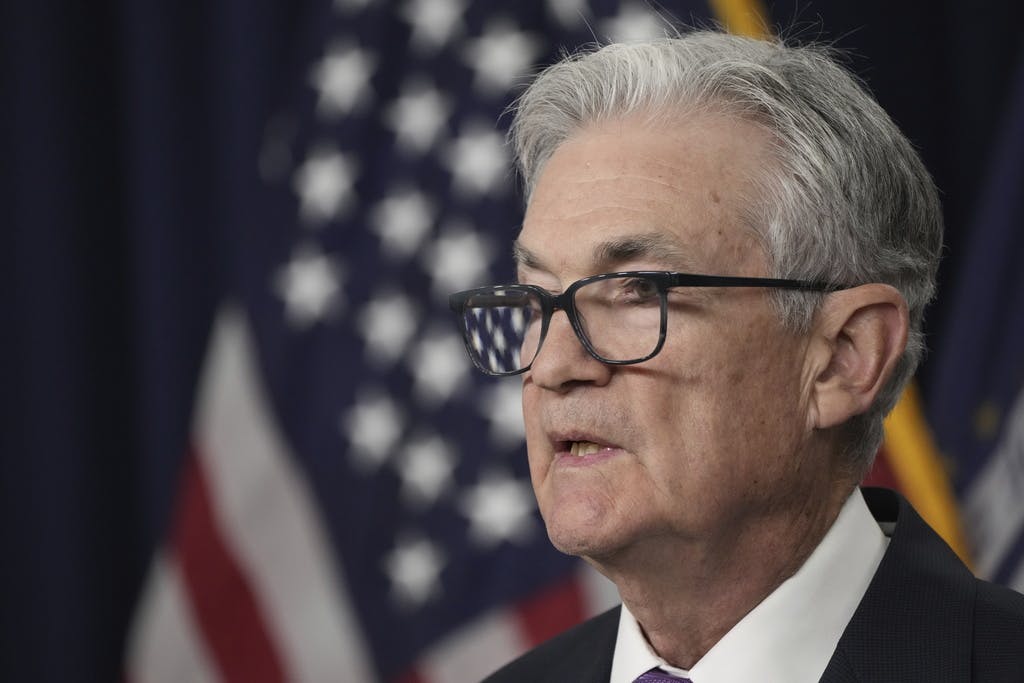Does Jerome Powell Know What Rising Prices Tell Us About Inflation?
In the past three years, oil prices have nearly doubled, and even now he fails to grasp it.

Oil prices are heading to $100 a barrel. Gasoline is moving back to $4 a gallon. Topline inflation has been going up — not down — in recent months because of the oil shock.
The Federal Reserve has a history of accommodating, or monetizing, oil shocks, especially the 1970s, but also including the early 2000s. So, now, the latest shock is a Fed challenge. Today at his press conference, though, the Fed head, Jerome Powell, never mentioned the oil shock — except, when reporter Edward Lawrence asked a question about it.
Here’s one of the goofiest answers you’re ever going to hear on this subject.
“We’re seeing oil prices, as you mentioned, move up and that’s pushing the price of gas,” Mr. Lawrence said. “So how does that factor into your decision to raise rates or not? Just the last two inflation reports, PCE and CPI, we’ve seen the overall inflation has actually risen.”
Mr. Powell replied: “You know, energy prices are very important for the consumer. This can affect consumer spending. It certainly can affect consumer sentiment. I mean, gas prices are one of the big things that affects consumer sentiment. It really comes down to how persistent, how sustained these energy prices are. The reason why we look at core inflation, which excludes food and energy, is that energy goes up and down like that. Don’t tell you much about where inflation’s really going. However, we’re well aware, though, that, you know, if energy prices increase and stay high, that’ll have an effect on spending. And it may have an effect on consumer expectations of inflation and things like that. That’s just things that we have to monitor.”
Wow. That’s your Fed head. I guess the key line is: doesn’t “tell you much about where inflation’s really going.” Really? No kidding. Can we review this for a second?
During the past 31 months, nearly three years, world oil prices have basically doubled in round numbers, to nearly $100 a barrel from $50 a barrel. It hit $125 at the peak last year. Along the way, gasoline has increased 52 percent.
And, then, various energy derivatives have exploded. For example, motor fuel up 52 percent, electricity up 25 percent. Let’s not forget groceries up 20 percent — because oil prices hit fertilizer, and fertilizer hit food.
I’m not going to bore you again with our list of approximately 200 items — and really many more — throughout every nook and cranny of the economy derived from various refined petroleum products. But we’ll give you some of the golden oldie highlights: diapers, plastic toys, soap, shampoo, baby clothes, life-saving products like pacemakers, MRI machines, and surgical instruments — it’s all tied to energy. And Mr. Powell doesn’t think it’s an important inflation factor right now.
Here’s another quick point: The Fed publishes these five-year projections of the economy, just like the old Soviet Five Year Plans, and the Fed is about as accurate as the Soviet Union was. So, let’s go back to the middle of 2021. The Fed was predicting 2 percent inflation, basically as far as the eye can see.
You may remember all that in 2021: there was no inflation. Then, it was transitory. Then, oops, they jacked up their target rate by 550 basis points, from zero.
The actual inflation rate in 2021 was around 5 percent, which is not zero. And the next year, in 2022, it was nearly 6 percent. By the way, the CPI hit a peak of 9.1 percent. That is also not zero.
Now, they’re telling us that they expect to raise their target rate some more. That’s what Mr. Powell said today. But they’re going to keep pausing. Now, I would suggest if you’re going to raise the rates, then raise them now. Let’s get it out of the way.
I would also suggest that when oil prices spike higher, causing great middle-class and lower-income suffering, the Federal Reserve should tighten policy to make sure the energy spike is not embedded into inflation forever. It’s the middle class who suffers the most. It’s the lower-income people who suffer the most.
This is why real wages keep falling the past nearly three years, burying President Biden’s poll ratings.
I would also suggest that, instead of targeting the economy or the unemployment rate, the Fed ought to use a broad commodity index, including gold, in order to preserve a stable commodity value of our money.
I’m just saying — if you want stable-value money that gives you price stability, not destroying the economy or jacking up the unemployment rate, just keep the dollar stable. And I like to use a broad commodity index, including gold. Including energy.
It’s not going to happen under Mr. Biden. It’s not going to happen under Mr. Powell. I don’t think they even remotely understand it. And that’s what’s so disappointing.
It’s like we had immaculate disinflation in 2021, then immaculate inflation later in 2021 and 2022. And now — now, I don’t know what we have. Well, we have Mr. Powell.
From Mr. Kudlow’s broadcast on Fox Business News.

